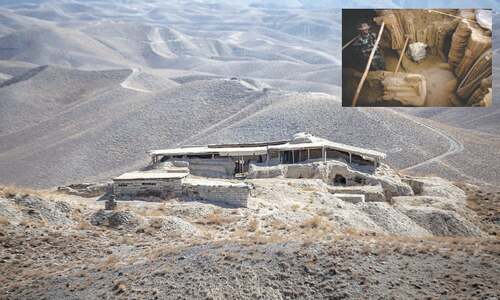KABUL: Afghanistan’s ruling Taliban on Sunday announced a ban on poppy production, even as farmers across the country began harvesting the bright red flower that produces the opium used to make heroin.
The order warns farmers that their crops will be burned and they can be jailed if they proceed with the harvest. Taliban’s spokesman Zabihullah Mujahid announced the ban at a news conference in the capital.
The decree also outlawed the transportation, trade, export and import of all types of narcotics such as alcohol, heroin, tablet K, hashish ... drug manufacturing factories in Afghanistan are strictly banned.
The ban is reminiscent of the Taliban’s previous rule in the late 1990s when the religion-driven movement outlawed poppy production. At that time, the ban was staggered and implemented countrywide within two years. The UN verified that production had been eradicated in most of the country.
Crops to be burned, farmers jailed in case of defiance of order
However, after their ouster in 2001 farmers in many parts of the country reportedly ploughed their wheat fields which had been almost impossible to bring to market because of the lack of roads and infrastructure and returned to poppy production.
During the last years of the Taliban rule, wheat was rotting in fields because the farmers were unable to bring it to market to be sold and ground into flour.
Poppies are the main source of income for millions of small farmers and day labourers who can earn upwards of $300 a month harvesting them and extracting the opium.
Today, Afghanistan is the world’s largest producer of opium and in 2021, before the Taliban takeover, produced more than 6,000 tonnes of opium, which a report from the UN Office on Drugs and Crime said could potentially yield 320 tonnes of pure heroin.
Afghanistan produces more opium than all opium-producing countries combined and last year was the sixth straight year of record opium harvests. That’s the case even as the US and international community was spending billions of dollars to eradicate poppy production. The Taliban reportedly made millions of dollars charging taxes on farmers and middle men to move their drugs outside Afghanistan and senior officials of the US-backed government were implicated in the flourishing drug trade.
Washington spent more than $8 billion trying to eradicate poppy production in Afghanistan during its nearly 20-year war, which ended with the return of the Taliban in August.
Nearly 80 per cent of heroin produced from Afghan opium production reaches Europe through Central Asia and Pakistan.
In desperately poor Afghanistan the ban on poppy production will further impoverish its poorest citizens.
According to a UN report in 2021, income from opiates in Afghanistan was a whopping $1.8 to $2.7 billion, more than 7pc of the country’s GDP. The same report said illicit drug supply chains outside Afghanistan make much more.
The Taliban’s ban comes as the country faces a humanitarian crisis that spurred the UN to ask for $4.4bn last month as 95pc of Afghans do not have enough to eat. The ban, while hitting drug production houses hard, will likely devastate the small farmer who relies on his opium production to survive. It’s difficult to know how the Taliban rulers will be able to create substitute crops and financing for Afghanistan’s farmers as their economy is in free fall and international development money has stopped.
Poppy production and income are often used as a form of banking among Afghanistan’s poorest who use the promise of the next year’s harvest to buy staples such as flour, sugar, cooking oil and heating oil.
When the Taliban last ruled, they employed village elders and mosque clerics to enforce the ban and in villages that ignored the ban, the Taliban arrested the elders and clerics, as well as the offending farmer. As a result, the elders and clerics were incentivised to prevent poppy production in their areas.
Published in Dawn, April 4th, 2022













































